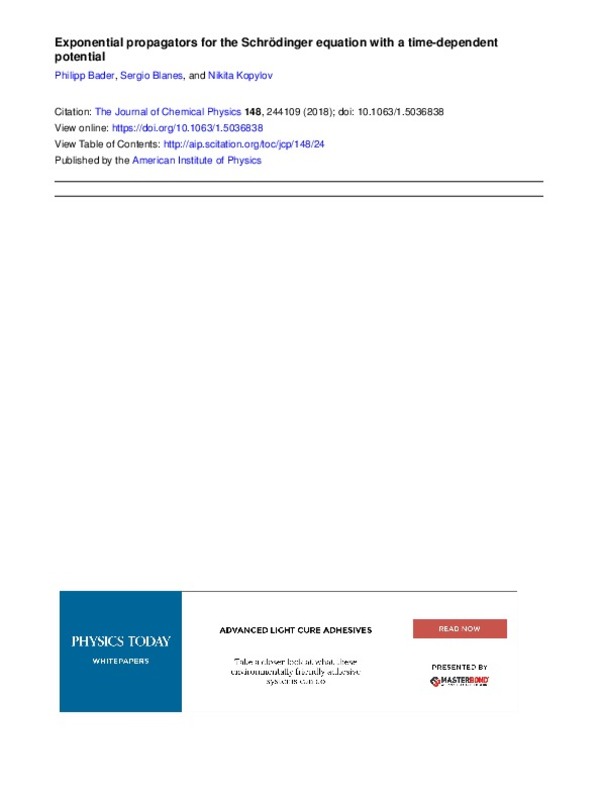Bader, P., Iserles, A., Kropielnicka, K., & Singh, P. (2014). Effective Approximation for the Semiclassical Schrödinger Equation. Foundations of Computational Mathematics, 14(4), 689-720. doi:10.1007/s10208-013-9182-8
Bader, P., Iserles, A., Kropielnicka, K., & Singh, P. (2016). Efficient methods for linear Schrödinger equation in the semiclassical regime with time-dependent potential. Proceedings of the Royal Society A: Mathematical, Physical and Engineering Sciences, 472(2193), 20150733. doi:10.1098/rspa.2015.0733
Lubich, C. (2008). From Quantum to Classical Molecular Dynamics: Reduced Models and Numerical Analysis. doi:10.4171/067
[+]
Bader, P., Iserles, A., Kropielnicka, K., & Singh, P. (2014). Effective Approximation for the Semiclassical Schrödinger Equation. Foundations of Computational Mathematics, 14(4), 689-720. doi:10.1007/s10208-013-9182-8
Bader, P., Iserles, A., Kropielnicka, K., & Singh, P. (2016). Efficient methods for linear Schrödinger equation in the semiclassical regime with time-dependent potential. Proceedings of the Royal Society A: Mathematical, Physical and Engineering Sciences, 472(2193), 20150733. doi:10.1098/rspa.2015.0733
Lubich, C. (2008). From Quantum to Classical Molecular Dynamics: Reduced Models and Numerical Analysis. doi:10.4171/067
Feit, M. ., Fleck, J. ., & Steiger, A. (1982). Solution of the Schrödinger equation by a spectral method. Journal of Computational Physics, 47(3), 412-433. doi:10.1016/0021-9991(82)90091-2
Tremblay, J. C., & Carrington, T. (2004). Using preconditioned adaptive step size Runge-Kutta methods for solving the time-dependent Schrödinger equation. The Journal of Chemical Physics, 121(23), 11535-11541. doi:10.1063/1.1814103
Sanz‐Serna, J. M., & Portillo, A. (1996). Classical numerical integrators for wave‐packet dynamics. The Journal of Chemical Physics, 104(6), 2349-2355. doi:10.1063/1.470930
Kormann, K., Holmgren, S., & Karlsson, H. O. (2008). Accurate time propagation for the Schrödinger equation with an explicitly time-dependent Hamiltonian. The Journal of Chemical Physics, 128(18), 184101. doi:10.1063/1.2916581
Peskin, U., Kosloff, R., & Moiseyev, N. (1994). The solution of the time dependent Schrödinger equation by the (t,t’) method: The use of global polynomial propagators for time dependent Hamiltonians. The Journal of Chemical Physics, 100(12), 8849-8855. doi:10.1063/1.466739
Castro, A., Marques, M. A. L., & Rubio, A. (2004). Propagators for the time-dependent Kohn–Sham equations. The Journal of Chemical Physics, 121(8), 3425-3433. doi:10.1063/1.1774980
Blanes, S., Casas, F., & Murua, A. (2017). Symplectic time-average propagators for the Schrödinger equation with a time-dependent Hamiltonian. The Journal of Chemical Physics, 146(11), 114109. doi:10.1063/1.4978410
Blanes, S., Casas, F., & Murua, A. (2015). An efficient algorithm based on splitting for the time integration of the Schrödinger equation. Journal of Computational Physics, 303, 396-412. doi:10.1016/j.jcp.2015.09.047
Gray, S. K., & Verosky, J. M. (1994). Classical Hamiltonian structures in wave packet dynamics. The Journal of Chemical Physics, 100(7), 5011-5022. doi:10.1063/1.467219
McLachlan, R. I., & Quispel, G. R. W. (2002). Splitting methods. Acta Numerica, 11, 341-434. doi:10.1017/s0962492902000053
Neuhauser, C., & Thalhammer, M. (2009). On the convergence of splitting methods for linear evolutionary Schrödinger equations involving an unbounded potential. BIT Numerical Mathematics, 49(1), 199-215. doi:10.1007/s10543-009-0215-2
Thalhammer, M. (2008). High-Order Exponential Operator Splitting Methods for Time-Dependent Schrödinger Equations. SIAM Journal on Numerical Analysis, 46(4), 2022-2038. doi:10.1137/060674636
Thalhammer, M. (2012). Convergence Analysis of High-Order Time-Splitting Pseudospectral Methods for Nonlinear Schrödinger Equations. SIAM Journal on Numerical Analysis, 50(6), 3231-3258. doi:10.1137/120866373
Gray, S. K., & Manolopoulos, D. E. (1996). Symplectic integrators tailored to the time‐dependent Schrödinger equation. The Journal of Chemical Physics, 104(18), 7099-7112. doi:10.1063/1.471428
Sanz-Serna, J. M., & Calvo, M. P. (1994). Numerical Hamiltonian Problems. doi:10.1007/978-1-4899-3093-4
Saad, Y. (1992). Analysis of Some Krylov Subspace Approximations to the Matrix Exponential Operator. SIAM Journal on Numerical Analysis, 29(1), 209-228. doi:10.1137/0729014
Park, T. J., & Light, J. C. (1986). Unitary quantum time evolution by iterative Lanczos reduction. The Journal of Chemical Physics, 85(10), 5870-5876. doi:10.1063/1.451548
Blanes, S., & Moan, P. C. (2000). Splitting methods for the time-dependent Schrödinger equation. Physics Letters A, 265(1-2), 35-42. doi:10.1016/s0375-9601(99)00866-x
Magnus, W. (1954). On the exponential solution of differential equations for a linear operator. Communications on Pure and Applied Mathematics, 7(4), 649-673. doi:10.1002/cpa.3160070404
Blanes, S., Casas, F., Oteo, J. A., & Ros, J. (2009). The Magnus expansion and some of its applications. Physics Reports, 470(5-6), 151-238. doi:10.1016/j.physrep.2008.11.001
Blanes, S., & Moan, P. C. (2006). Fourth- and sixth-order commutator-free Magnus integrators for linear and non-linear dynamical systems. Applied Numerical Mathematics, 56(12), 1519-1537. doi:10.1016/j.apnum.2005.11.004
Thalhammer, M. (2006). A fourth-order commutator-free exponential integrator for nonautonomous differential equations. SIAM Journal on Numerical Analysis, 44(2), 851-864. doi:10.1137/05063042
Alvermann, A., & Fehske, H. (2011). High-order commutator-free exponential time-propagation of driven quantum systems. Journal of Computational Physics, 230(15), 5930-5956. doi:10.1016/j.jcp.2011.04.006
Auer, N., Einkemmer, L., Kandolf, P., & Ostermann, A. (2018). Magnus integrators on multicore CPUs and GPUs. Computer Physics Communications, 228, 115-122. doi:10.1016/j.cpc.2018.02.019
Munthe–Kaas, H., & Owren, B. (1999). Computations in a free Lie algebra. Philosophical Transactions of the Royal Society of London. Series A: Mathematical, Physical and Engineering Sciences, 357(1754), 957-981. doi:10.1098/rsta.1999.0361
Bader, P., Blanes, S., Ponsoda, E., & Seydaoğlu, M. (2017). Symplectic integrators for the matrix Hill equation. Journal of Computational and Applied Mathematics, 316, 47-59. doi:10.1016/j.cam.2016.09.041
P.V. Koseleff, “Formal calculus for Lie methods in Hamiltonian mechanics,” Ph.D. thesis, Lawrence Berkeley Laboratory, 1994.
Chin, S. A. (1997). Symplectic integrators from composite operator factorizations. Physics Letters A, 226(6), 344-348. doi:10.1016/s0375-9601(97)00003-0
Omelyan, I. P., Mryglod, I. M., & Folk, R. (2002). Construction of high-order force-gradient algorithms for integration of motion in classical and quantum systems. Physical Review E, 66(2). doi:10.1103/physreve.66.026701
Walker, R. B., & Preston, R. K. (1977). Quantum versus classical dynamics in the treatment of multiple photon excitation of the anharmonic oscillator. The Journal of Chemical Physics, 67(5), 2017. doi:10.1063/1.435085
Iserles, A., Kropielnicka, K., & Singh, P. (2018). Magnus--Lanczos Methods with Simplified Commutators for the Schrödinger Equation with a Time-Dependent Potential. SIAM Journal on Numerical Analysis, 56(3), 1547-1569. doi:10.1137/17m1149833
[-]









